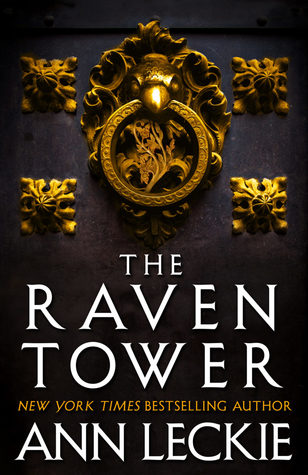How by all the trees of the forest are you supposed to review this book? The experience of reading it is the most fun, fascinating, mind-warping ride through time, space and existentialism I've had since ... well, since reading Ancillary Justice. But I can't tell you a thing about it because that would ruin your ride.
I went to Goodreads to see how other people manage it—it turns out most people just spoil everything, so proceed with caution*—and someone's review said ... oh, mmblefarg, I can't even tell you that without spoiling a lot of things! Here, I'll make it small and yellow so you can't see it unless you highlight it: it's inspired by Hamlet. My brain just exploded. It's frigging Hamlet, people. As in, mad Ophelia, Rosencranz and Guildenstern, Horatio ... it's a Shakespeare retelling and I didn't even notice.
Suffice it to say it's one more layer of utter brilliance that retroactively doubled my enjoyment of the whole book!
What can I say to make you want to read it? People have warned that it starts slowly, and it does. You think it's about an heir returning from the war front to discover his uncle has usurped his place. If you then expect lots of politicking and/or fighting for him to regain his throne, you will be disappointed. The plot is both smaller and much, much larger than that. I think I can safely tell you gods are involved. (I was thinking Greek tragedy as I was reading. Turns out I wasn't far off.)
People have talked about the narrative voice: it starts out in second person, which is clever and technically challenging and could be really annoying after a while, except that you figure out fairly quickly who "you" is, so then you start wondering to yourself who might be talking. That takes a fun while to figure out, and once you piece that together, you wonder why the speaker is addressing the you, and you slowly work that out over the course of the novel (as does 'you').
The whole novel is a mystery, and it's a mystery you the reader are figuring out with a slightly different set of clues from you the character. Leckie does the same thing she did so brilliantly in Ancillary Justice: weaving a past and a present timeline together so that the things you learn in each timeline explain just enough of the other timeline to raise the stakes and make you care more. And keep you guessing!
But I hate books that deliberately withhold information so you can be surprised at the twist ending. Leckie doesn't do that. She gives you enough information to be pretty sure you know what's going to happen, but to be intensely curious how it's going to play out, and then you get the next bit of information and realize, oh, ho, now I see what's going to happen! And now I'm even more curious! And then the ending happens, and you're like, "Woah, didn't see that coming! But she was telling me all along that that's what was going to happen!"
I spent a lot of time while reading this with a big grin on my face, and I wasn't even sure what I was grinning at. I just love the way Leckie plays with my brain, I guess. And her characters. We are told nothing about them; we only know what they say and do, and what they speculate about each other, so it is difficult at first to connect with them, to know who to root for. But words and actions and speculation are what create character, and by the end I just loved the two people whose names I can't tell you because that would be spoilery! Fist-punching yes-shouting love.
There is so much going on in this novel. Leckie dissects human society and power and loyalty and faith and all those things you can play with when you've got kingdoms and gods and war and usurpation. But she's also playing with stories and the power of words and the power of who gets to tell the story. And the fundamental premise at the heart of all stories about magic: be careful how you say what you wish for.
Note that she has been developing this world of gods making deals with humans for many years; there are a lot of short stories available online that will give you a flavour. Try The Nalendar, for example.
At a restaurant recently I had a dish called Roasted Cauliflower in Romesco Sauce that was so delicious I had to try it at home: I roasted tomato quarters and red pepper chunks and onion wedges with the cauliflower florets, olive oil, salt, pepper and paprika for a good hour and a half, until all the flavours were intense and rich. Added a splash of apple cider vinegar and some smoked paprika. (The restaurant version had toasted almonds and crispy capers, and I'm sure there was garlic but I didn't have any on hand.) Lots of complex flavour layers and the surprise of cauliflower tasting that good (really it's just a mild vehicle for the sauce). I was as happy eating it as I was reading this book!
*I have not given you a link to the Goodreads page for this book, because I really, really don't want you to get inadvertently spoiled. This review from By Singing Light is excellent and entirely non-spoilery. Ditto everything she said!

Oh my God it IS Hamlet! How did I not notice? I just read this book, and no part of me noticed that it was Hamlet, even though -- as I look back at it -- it's extreeeeeeemely Hamlet. Sheesh, I do not feel great about myself as a Shakespeare fan today. :p
ReplyDeleteI know, right? Such a "duh!" moment.
Delete